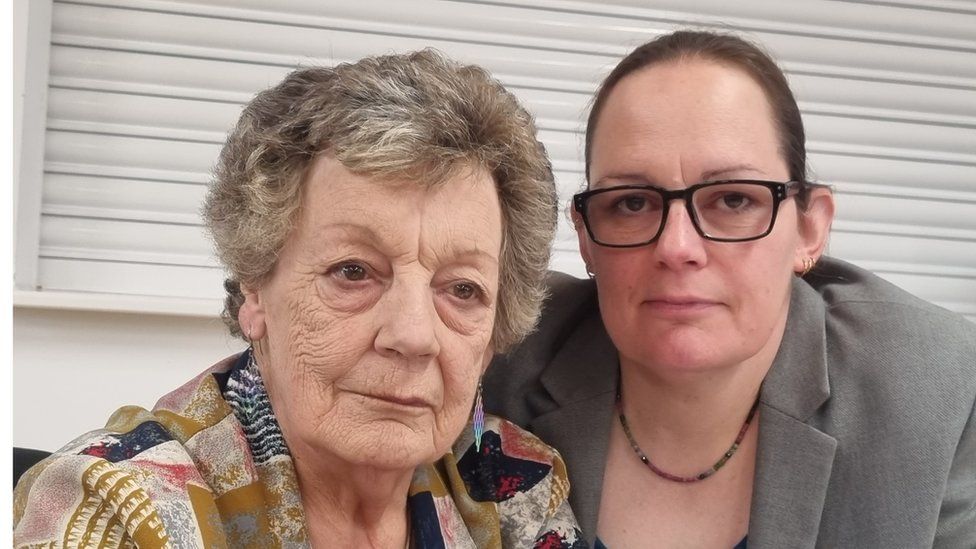ARTICLE AD BOX
 Image source, Tina Prior
Image source, Tina Prior
Tina Prior said her mother was given six days notice that her operation had been postponed.
By Nikki Fox
BBC health correspondent, East of England
The daughter of a pensioner said she was concerned for her mother's eyesight as doctor strikes delayed an operation.
Tina Prior said her mother's brain surgery at Addenbrooke's Hospital in Cambridge had been postponed.
The chair of the trust, ranked one of the world's best, agreed industrial action was affecting patient safety.
The British Medical Association said it "didn't want to bring the NHS to a standstill" while the government said patient safety was its "top priority".
Dr Mike More, chair of Cambridge University Hospitals NHS Foundation Trust, said in a recent board meeting that surgery postponements were creating "patient anxiety" and were having "destabilising effects" on improvements.
Image source, Cambridge University Hospitals
Image caption,The chair of Addenbrookes Hospital, Dr Mike More, said he was "very much aware of the consequences of the strikes"
He said it was "deeply frustrating and worrying" that the dispute had reached a "long-term attritional state, with no evident resolution in prospect".
Miss Prior, 47, from Chatteris, Cambridgeshire, said her 79-year-old mother's eyesight was potentially at risk, but her operation was postponed last Wednesday.
She said the benign tumour on the base of her brain, was pushing on the optic nerve.
"She's never in her life had to go into hospital to have major surgery," said Miss Prior.
"Mentally, you have to really prepare yourself for that. She's been getting very anxious and very worked up."
Miss Prior, who has a tea room business, said she had cancelled bookings in preparation for her mother's surgery.
She said she did not have a new date for the procedure and her mother had been "left in limbo."
'Who knows when?'
Kathy, from Chelmsford, who did not want to use her surname because she works in the NHS, said she was on an urgent waiting list for an operation on her hand.
After 37 weeks of waiting, she said she had been told it was a case of "who knows when you'll get your surgery".
She said the industrial action was costing the NHS.
"Last week I ended up in A&E because of my hand getting even worse and it's costing more taxpayers money," she said.
"I was told that if I had a private appointment, I could get it done next week. They [the government and British Medical Association] need to sit down and talk."
'We've become a number'
Lauren Golding, from Essex, said she was waiting for a diagnosis following sudden hair loss and stomach pains two years ago.
She was due to see a doctor on Wednesday but has been forced to wait six weeks for a new appointment.
"I think we've become a number now because there's so many people in the queue," she said.
"I don't feel like we're treated as people."
NHS Trusts said the industrial action was having a significant impact on the surgery backlog which built up during the pandemic.
According to the Princess Alexandra Hospital in Harlow, from 1 April to the end of August, 15% of capacity for planned operations was lost due to industrial action.
At Southend Hospital, 400 operations had been postponed during the current round of strikes, with 500 affected at Milton Keynes General.
But consultants belonging to the British Medical Association said they believed if action short of a strike was taken, the government would not listen.
Image source, Craig Vickery
Image caption,Consultant Craig Vickery said he hoped patients would not have to die for the government to listen
Craig Vickery, a consultant general surgeon at the West Suffolk Hospital, said: "They have tried to do a 'work to rule' in the past, which means doing our normal nine-to-five hours and none of the extra.
"The government paid no attention to it at all, and actually neither did the press, so it didn't get reported.
"It is the only way to get the government's attention."
He also said that patient cancellations were happening "all the time", regardless of the strikes, because of a lack of beds and rota gaps due to a lack of doctors.
Health Secretary Steve Barclay said his door was "always open" but he was considering regulations that would require some doctors and nurses to work during strikes, to protect patient safety.
"My top priority is to protect patients and these regulations would provide a safety net for trusts and an assurance to the public that vital health services will be there when they need them," he said.
"This week's co-ordinated and calculated strike action will create further disruption and misery for patients."
Follow East of England news on Facebook, Instagram and X. Got a story? Email eastofenglandnews@bbc.co.uk or WhatsApp us on 0800 169 1830.

 1 year ago
38
1 year ago
38








 English (US) ·
English (US) ·